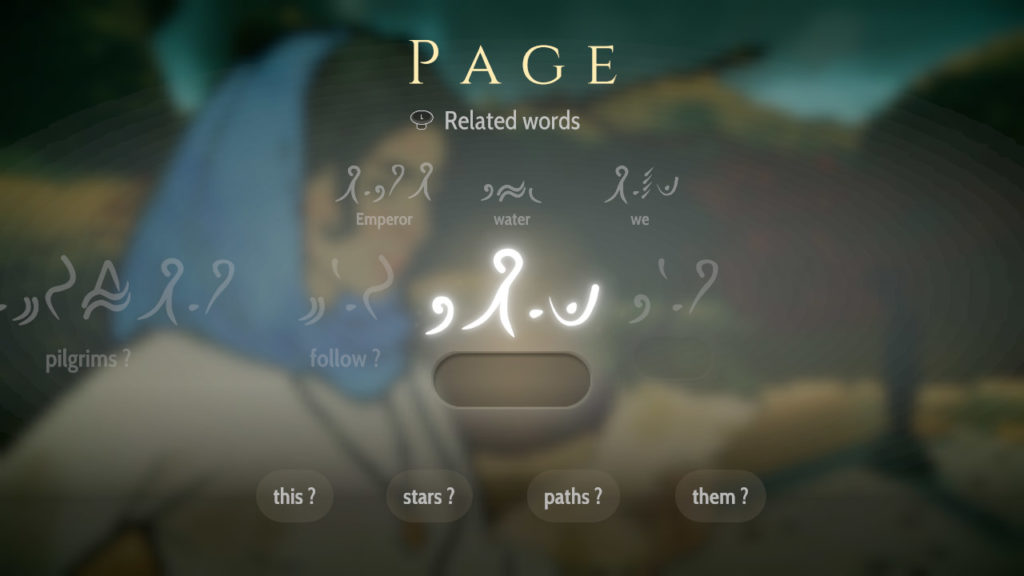Available On: PC, PlayStation 4, Switch
Played On: Switch
When you think “archeologist” for a protagonist, you probably conjure a certain fedora-wearing, whip-wielding, Nazi-punching hero. Real archeology is slightly less exciting and dangerous, however.
Delving into ancient cultures and discovering new hidden truths can make for a compelling story, however. Heaven’s Vault embraces linguistic puzzles and ancient exploration within a unique fantasy world, but you’ll have to slog through some agonizingly slow and tedious gameplay to see it all.
Word Finder
In Heaven’s Vault you play as Aliya, a sensibly-dressed archeologist in a world of floating mini-moons connected by flowing rivers. The exploration kicks off when a friend of the university you work for goes missing, leaving behind a trail of clues that lead to startling revelations about this unique world and its history and culture.
Aliya isn’t an action hero, but she is quite skilled at deciphering the ancient language called…Ancient. Ancient is everywhere, written in books, on statues, above fireplaces, and more. Every ancient site you discover and object you unearth has writings to decipher.
Deciphering the language is the only real puzzle throughout the game, and you’ll be doing it a lot. Thankfully it’s a fun design, with each phrase offering multiple choice answers. As you recognize words in other areas you’ll become more confident with each word, organically building a lexicon. Knowing the words for “water” and “hold” makes it easier to guess the word “cup,” for example. On the flip side, it’s possible to create a cascading dam of confusion if you mistranslate a word. Heaven’s Vault is eager to let you learn, and make your own mistakes, to forge your path forward.
Words are presented in an easy drag-and-drop interface, and you can always go back and change previous translations using the timeline interface. The staggering amount of words and ways in which they’re used is impressive. It’s a shame that almost everything between the word puzzles is a drag.
Belongs in a Museum
In order to travel to each overgrown graveyard and hidden garden, you’ll navigate along the rivers that flow between each area using your ship, the Nightingale. Traveling along stellar rivers should be enjoyable, but it’s agonizingly slow and ultimately pointless. There’s no danger to avoid, no collectibles to gather, no information to learn. If you miss a turn you can simply hit a button to retry.
Steering is done with the shoulder buttons (on console) but there’s little point. Often I could set the controller down and end up where I needed to go, yet it would still take way too long. Thankfully you can hand control over to your robot friend as a form of fast travel – but only if you’ve already been there once before, and much of the story development includes searching for new lost sites and delving into uncharted territory.
Exploring on foot is almost as tedious. The walking speed is incredibly slow and clunky, and it can be annoyingly difficult to target different hotspots or get to certain areas. Characters are drawn in a lovely 2D art style, but animate extremely poorly in the 3D world. Heaven’s Vault would have been much better served as a series of 2D screens (like a classic Point and Click adventure game) rather than heavily limited 3D exploration. More voice acting would have also helped. Aliya’s rare voiced inner-monologue is nice, but archeology is a lonely affair, and characters are few and far between.
 The Rating
The Rating
Heaven’s Vault has not been rated by the ESRB. There’s no violence, action, or danger. The storytelling is very academic and mature, dealing with entire cultures and history, and linguistic puzzles are not exactly kid-friendly.
The Takeaway
Heaven’s Vault’s biggest triumph is using language as a puzzle. Gaining knowledge that builds and expands just like learning a real-world language is academically compelling, while providing an intriguing backstory of ancient gods, fallen empires, and rebirth. At the same time the gameplay vigorously applies a constant repellant every time you travel and explore new sites, dragging what should have been a 10 hour expedition into a nearly 20 hour slog.


